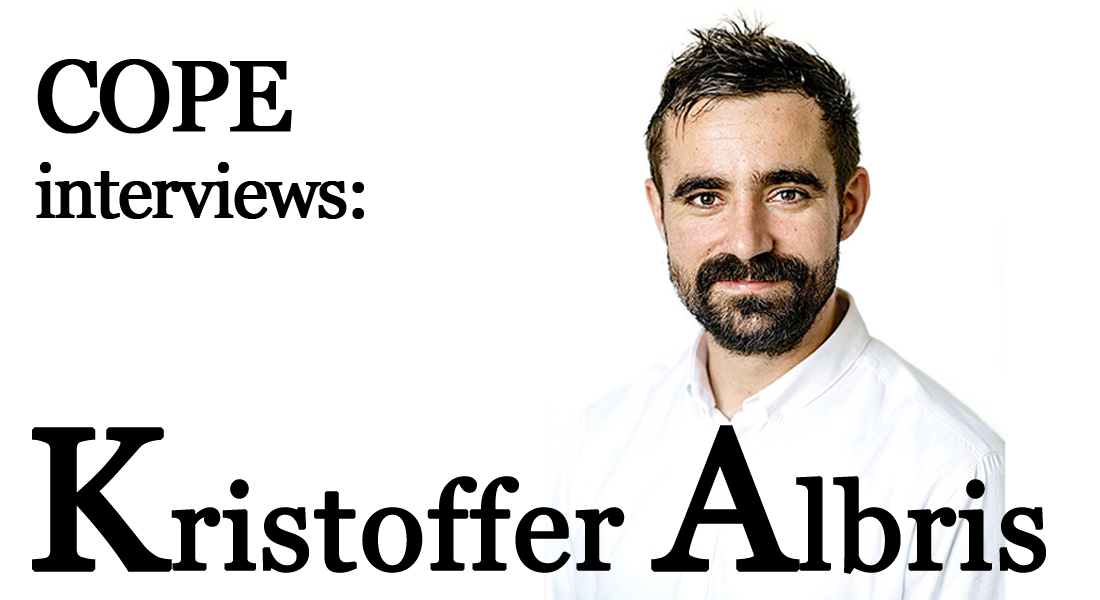Interview with Kristoffer Langkjær Albris
I contributed to the UNDRR 2023 Regional Assessment Report on Disaster Risk Reduction in Europe and Central Asia in collaboration with Emmanuel Raju, by reporting on insights from our study of Denmark's disaster risk reduction and climate change adaptation plans and policies as part of the ESPRESSO EU project. Our reporting on the Danish case fed into the overall report, by highlighting some of the challenges facing Denmark, especially concerning storm surges and sea level rise, given Denmark's geographical characteristics.

COPE interviews Kristoffer Albris, Associate Professor at Anthropology and SODAS, University of Copenhagen, Head of Studies for M.Sc. in Social Data Science.
What do you do at COPE and how does your anthropological expertise inform the center’s work?
I have been affiliated with COPE since my PhD, which I completed in 2017. I have been collaborating with various people in COPE over the years, on larger and smaller projects. My main place of employment is a the Department of Anthropology and at the Center for Social Data Science, at University of Copenhagen. Leveraging my anthropological expertise, I explore the intricate interplay between disaster dynamics, socio-cultural contexts, and governance structures. Through ethnographic inquiry and interdisciplinary collaboration, I strive to uncover the underlying social, political, and economic factors that shape vulnerability and resilience in these areas. My work involves conducting field research, analyzing data, and contributing insights to inform disaster risk reduction strategies and policies. By bridging academic research with practical applications, I hope to be able to contribute to better disaster risk governance frameworks in Denmark and beyond, and to cement the relevance of social science approaches to the study of hazards and risk more generally.
You contributed to the 2023 Regional Assessment Report on Disaster Risk Reduction in Europe and Central Asia published by the United Nations Office for Disaster Risk Reduction. In your opinion, what are the most important findings for the region?
I contributed to the UNDRR 2023 Regional Assessment Report on Disaster Risk Reduction in Europe and Central Asia in collaboration with Emmanuel Raju, by reporting on insights from our study of Denmark's disaster risk reduction and climate change adaptation plans and policies as part of the ESPRESSO EU project. Our reporting on the Danish case fed into the overall report, by highlighting some of the challenges facing Denmark, especially concerning storm surges and sea level rise, given Denmark's geographical characteristics. At a general level, the overall report underscored the disproportionate impact of disasters on marginalized communities and emphasized the importance of inclusive approaches to disaster risk reduction. It also highlighted the integration of traditional knowledge and local practices into preparedness and response efforts as pivotal for enhancing resilience. By recognizing diverse perspectives and adaptive strategies, the region can better mitigate risks and build resilience in the face of environmental challenges. These are, in general, perspectives and arguments that are very much in line with my own research.
You are currently the PI in the Coastal Conflicts project funded by Independent Research Fund Denmark. Could you tell us more about that? (feel free to broaden this question to include any projects you would like)
As the Principal Investigator (PI) of the Coastal Conflicts project, my research endeavors to understand the complexities of conflicts in coastal areas. First, this entails conducting a vast amount of desk research with the aim of mapping and classifying all conflicts related to storm surge risk reduction and coastal protection measures in Denmark. By doing so, we hope to provide the first full overview of what characterizes disagreements over coastal protection. Additionally, through ethnographic methods and stakeholder engagement, the project examines how competing interests over coastal resources intersect with socio-political dynamics. By analyzing conflict patterns and identifying pathways for resolution, we aim to inform sustainable coastal governance strategies in Denmark, and hopefully beyond.
What are the next steps for your projects and research plans overall?
Looking ahead, the next steps for my research involves further fieldwork, data analysis, and dissemination of findings through various channels. For the Coastal Conflicts project, this entails expanding case studies, engaging stakeholders, and developing policy recommendations based on our research insights. Additionally, we plan to explore new research avenues to address emerging challenges in coastal sustainability and governance at a larger scale. In doing so, my plan is to secure funding for a large project that covers the North Sea Region. Here, the focus will be to investigate how people living by the coast perceive future scenarios with higher sea levels, and increased frequencies of severe storm surges.
| If you would like to know more about Kristoffer Albris' work, please find him on LinkedIn or contact via email. |
